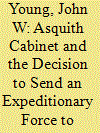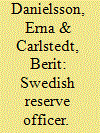| Srl | Item |
| 1 |
ID:
189258


|
|
|
|
|
| Summary/Abstract |
The decision to send the British Expeditionary Force to France has been much discussed from the perspective of its long-term military-strategic background. Yet where the eventual decision to despatch the Force in August 1914 is concerned, limited attention has been paid to the role of the British Cabinet, which gave political approval to the step. Some historians have highlighted a Cabinet decision of 1 August against sending the BEF abroad and pointed out that Prime Minister H.H. Asquith and two key ministerial allies – Lord Haldane and Sir Edward Grey – accepted it. No one has provided a full analysis of why this trio of ministers consistently stuck to their position over the following days. Nor does a full explanation exist of the Cabinet’s eventual agreement, on 6 August, to approve the despatch of the Force. This analysis addresses these questions, arguing that far from being some reluctant step forced on the interventionists by their anti-war colleagues, Asquith, Haldane, and Grey pre-emptively decided to delay the despatch of the BEF. They did this as a way of preventing the disintegration of the government, while leaving open the possibility that Britain would go to war.
|
|
|
|
|
|
|
|
|
|
|
|
|
|
|
|
| 2 |
ID:
104082


|
|
|
|
|
| Publication |
2011.
|
| Summary/Abstract |
The aim of this study is to examine the reserve force's role in and contribution to the new Swedish expeditionary armed forces. Survey data were obtained from 418 reservists. The results show that reserve officers are well educated and hold high positions in the civil society. According to the reserve officers themselves, the Armed Forces do not ask for their nonmilitary competence. The discontent with this situation is greater among the younger reservists as opposed to the older ones. Four different opinions on the need for the reserve officers are suggested. First, reserve officers are requested to fill vacancies, that is, a volume regulator. Second, the reserve officers are needed because they have unique competences other than military that are used by the armed forces. Third, reserve officers are needed from an economic point of view. Finally, reserve officers contribute to the civil-military relationship. However, when using a framework intended for regular officers, the contribution of the reserve officers' civil professional competence has not been recognized.
|
|
|
|
|
|
|
|
|
|
|
|
|
|
|
|